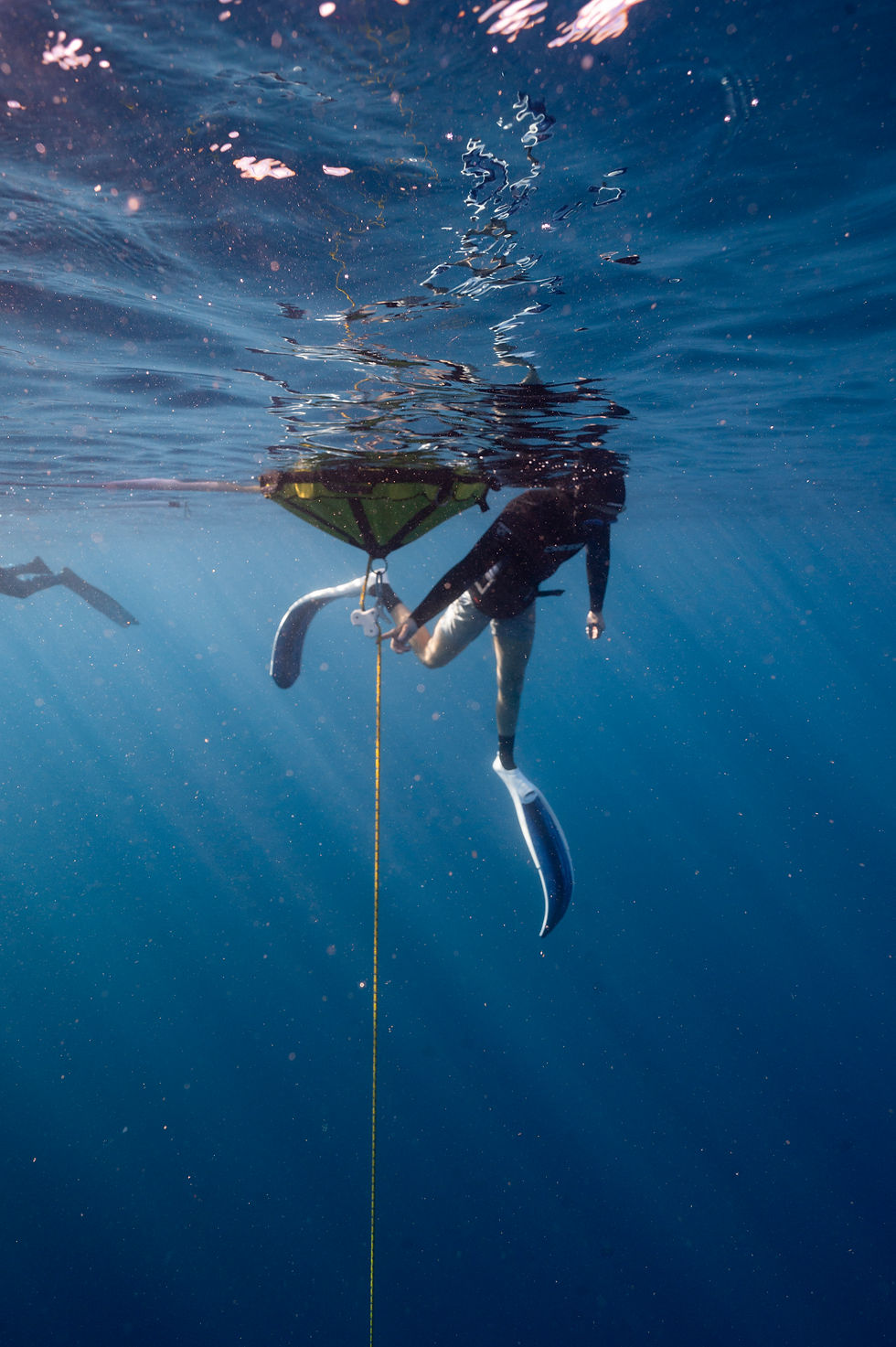Lessons from the Best Freedivers in the World!
- Curtis Tredway

- May 25, 2025
- 4 min read
Updated: Jun 1, 2025

I recently had the privilege of being on the Camotes Freediving Safety Team at the CMAS World Cup in Camotes, Philippines. It was an incredible experience, witnessing some of the deepest dives in the world. We saw multiple World Records, countless National Records, and some of the most impressive performances I’ve ever been part of.
And while I wasn’t competing, the learning was non-stop.
Many of these lessons are things I already teach my students, but seeing them play out at the elite level really reinforced just how important they are. Whether you dive to 10 metres or 100, this sport keeps us humble, curious, and always growing.
Here’s what stood out the most.
Know your limits and respect them
The best divers I saw had no issue calling a dive if something felt off. No hesitation. No drama. Just a clear decision to look after their body and save themself for their next dive day.
This is something I always reinforce with students, your safety and long-term progress matter more than any single dive.
Takeaway: You don’t lose progress by turning early. You gain self-awareness.
Everyone has off days — even the best
Some of the strongest divers on paper struggled during the comp. Early turns, failed dives, equalisation issues, mental blocks. It didn’t matter how deep they were capable of going. It reminded me that no one is immune to bad days.
Takeaway: Bad dives are just part of the journey. It’s how you respond that counts.
Ego will take you places your body isn’t ready to go
I saw what happens when someone forces a dive for the wrong reasons. Skipping rest. Ignoring their body. Pushing through discomfort when they should have adapted. More often then not, it backfired.
Takeaway: Leave the ego on land. It'll humble you in the water.
There’s no perfect formula, only what works for you
There were elite athletes with completely different approaches to nutrition, warm-ups, mindset, sleep, training, everything. Some fasted. Others had big breakfasts. Some trained daily. Others barely did. Some even had alcohol and cigarettes the night before their dives.
There’s no one way to be a great diver.
Takeaway: Learn what works for you and build a routine around that, not someone else's checklist. The best thing you can do as a diver is learn off as many people as possible and start crafting your own formula.
Trust in your safety team changes everything
I saw divers completely relax and dive with flow simply because they trusted their safeties. As someone on the other side of that equation, it meant a lot. Clear communication, tight systems, and calm presence from the safety team made a visible difference in performance.
Takeaway: Trust lets you let go. And letting go is where the magic happens. Whether its your Safety, Coach, or Buddies, you need to have trust in the safety's ability and experience.
Setbacks will come — how you reset is what matters
There were divers who had blackouts, bad dives, even small injuries. Some took the next day off. Others made subtle changes and tried again. What mattered wasn’t whether they failed. It was how they regrouped.
As a coach, I often say this: persistence is powerful, but so is perspective.
Takeaway: Don’t just push through. Pause, reset, and move with intention.
Let go of the idea that it will all go to plan
Some divers came in with clear expectations. Some hit their goals. Others didn’t.. But the most fulfilled weren’t the ones who ticked boxes.
They were the ones who stayed open to what the experience gave them - not just what they expected to get.
Takeaway: Flexibility in mindset and trusting the process will free you of expectation. It's expectation that often gets in the way of your dive.
Never get too comfortable
Even the conservative dives didn’t always go smoothly. Divers who were well within their training numbers still had issues. This was a reminder to all of us - the ocean has the final say, not your spreadsheet.
One example was Alessia Zechinni, after setting a World Record 4 days prior, was doing a relatively conservative dive in her strongest discipline. Yet, she experienced strong nitrogen narcosis. Her expected 4 minute dive turned into a 5 minute + dive, and she ended up needing a deep black out rescue. Whether you are a diver, safety, coach, or buddy, take every dive seriously and be ready to respond if things don't go to plan.
Takeaway: Stay sharp, stay humble, and never assume anything at depth. As a safety, always be ready to respond.
Want to Learn These Lessons Without the Hard Way?
These are all things I’ve learned through years of diving and now through seeing the world’s best in action. As an instructor, I weave these lessons into every course I teach - from beginner through to advanced.
If you’re serious about taking your freediving to the next level, whether that’s refining your technique, building more confidence in the water, or learning to dive smarter not harder, I’d love to help.
You can learn with me through a Wave 1 or Wave 2 course in Sydney, Wollongong and Central Coast, or join one of our retreats where we put these lessons into practice in some of the best locations in the world.
📩 Reach out at info@deepsensationsfreediving.com📸 Or follow along at @deepsensationsfreediving
See you in the water.
.png)



Comments